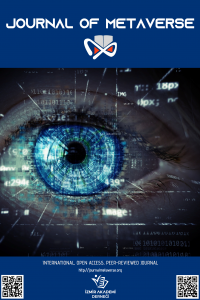Metaverse: A Potential Virtual-Physical Ecosystem for Innovative Blended Education and Training
Metaverse, blended learning, virtual learning, personalized learning, metaverse types, artificial intelligence, education models
Metaverse: A Potential Virtual-Physical Ecosystem for Innovative Blended Education and Training
Metaverse, blended learning, virtual learning, personalized learning, metaverse types, artificial intelligence, education models,
___
- L. H. Lee et al., "All One Needs to Know about Metaverse: A Complete Survey on Technological Singularity, Virtual Ecosystem, and Research Agenda," Journal of Latex Class Files, vol. 14, no. 8, pp. 1–66, September 2021.
- S. Mystakidis. "Metaverse," Encyclopedia, MDPI, pp. 486-497, February 2022.
- S. B. Far and A. I. Rad, "Applying Digital Twins in Metaverse: User Interface, Security and Privacy Challenges," Journal of Metaverse, vol. 2, issue 1, pp. 8-15, 2022.
- H. Duan et al., "Metaverse for Social Good: A University Campus Prototype," in Proceedings of the 29th ACM International Conference on Multimedia, pp. 153–161, October 2021.
- S. M. Park and Y. G. Kim, "A Metaverse: taxonomy, components, applications and open challenges," IEEE Access, vol. 10, pp. 4209-4251, 2022.
- S. Mitra and S. Gupta, "Mobile Learning under Personal Cloud with a Virtualization Framework for Outcome Based Education," Education and Information Technologies, Springer-Nature, vol. 25, issue 3, pp. 2129-2156, 20209.
- S. Mitra and S. Gupta, "Own Device-Based Mobile Learning in Personal Cloud Environment: A framework to address Digital Divide," Journal of Engineering Education Transformations, vol. 32, issue 4, pp. 46-54, 2019.
- B. Kye, N. Han, E. Kim, Y. Park, and S. Jo, "Educational applications of metaverse: possibilities and limitations," Journal of Educational Evaluation for Health Professions, vol. 18, pp. 1-13, December 2021.
- T. Ahmed et al., "Is Metaverse in education a blessing or a curse: a combined content and bibliometric analysis," Smart Learning Environments, Springer, vol. 9, issue 24, pp. 1-31, July 2022.
- N. M. M. Araya and R. S. H. Avila, "Collaboration learning through integration of environments real and virtual-immersive," in Proceedings of the 37th IEEE International Conference of the Chilean Computer Society, pp. 1-8, 2018.
- Hirsh-Pasek et al., "A whole new-world Education meets the Metaverse," The Brookings Institution. A whole new world: Education meets the metaverse (brookings.edu), February, 2022.
- J. E. M. Diaz, C. A. D. Saldana and C. A. R. Avila, "Virtual World as a Resource for Hybrid Education," International Journal of Emerging Technologies in Learning(iJET), vol. 15, issue 15, pp. 94-109, August 2020.
- G. J. Hwang and S. H. Chien, "Definition, roles and potential research issues of the metaverse in education: An artificial intelligence perspective," Computers and Education: Artificial Intelligence, Elsevier, vol. 3, pp. 1-6, May 2022.
- OpenSimulator, Available Online : OpenSimulator - Wikipedia, August 2022.
- Yayın Aralığı: Yılda 2 Sayı
- Başlangıç: 2021
- Yayıncı: İzmir Akademi Derneği
The Metaverse or Meta-Awareness?
Use of Metaverse Technology in Education Domain
Khandaker Raiyan RAHMAN, Sholaiman Khan SHİTOL, Md Sohidul ISLAM, Kh. Tanveer IFTEKHAR, Pranto SAHA
Jason Robert RAMESHWAR, Graham KİNG
Abdul SYUKUR, Pulung Nurtantio ANDONO, Khafiizh HASTUTİ, Arry Maulana SYARİF
Kemal Gökhan NALBANT, Sevgi AYDIN
Metaverse: A Potential Virtual-Physical Ecosystem for Innovative Blended Education and Training
The Age Beyond Sports: User Experience in the World of Metaverse
